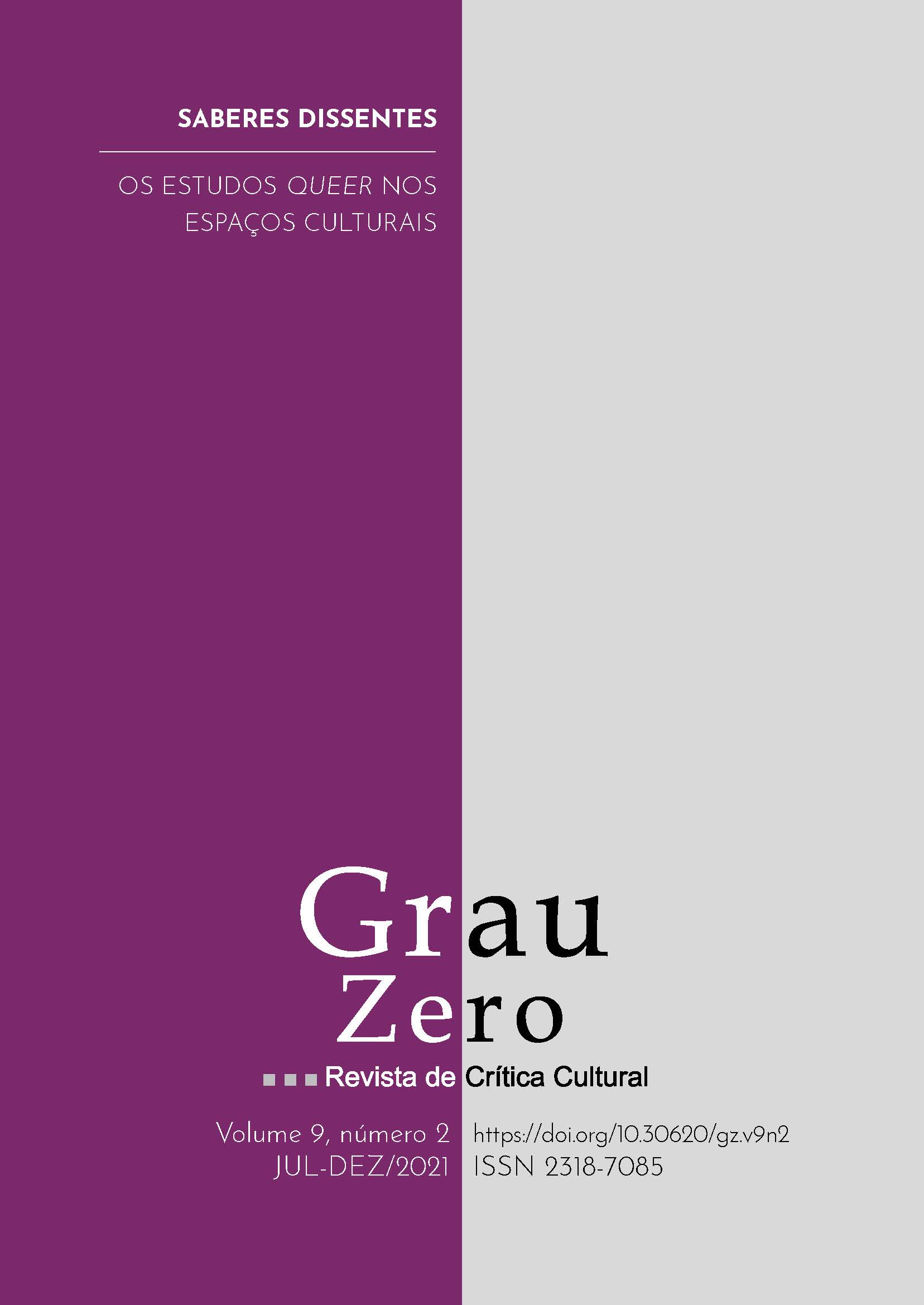Cowboys and angels and affective queers
DOI:
https://doi.org/10.30620/gz.v9n2.p261Palavras-chave:
Brokeback Mountain, Queer theory, Affects, Annie Proulx, HeteronormativityResumo
Taking into consideration the critical and media attention American writer Annie Proulx’s story “Brokeback Mountain” has received, this paper offers a reading of the aforementioned work while problematising issues of heteronormativity in the plot. Using Sara Ahmed’s and Heather Love’s theoretical contributions, this investigation interweaves queer theory and affect studies to highlight how heteronormativity is an affective orientation in which feeling bad is crucial to maintain the structure of oppression. Although more questions rather than answers are provided, this study concludes that political mobilisations are possible when affects are read and questioned, especially those considered backward.
[Recebido: 20 set. 2021 – Aceito: 25 out. 2021]
Downloads
Referências
AHMED, Sara. Queer Phenomenology: Orientations, objects, others. Durham and London: Duke University Press, 2006.
AHMED, Sara. The Cultural Politics of Emotion. Edinburg: Edinburgh University Press, 2014 [2004].
BASH BACK!. Ultraviolência Queer. Trad. Pontes Outras. São Paulo: Crocodilo; n-1 edições, 2020.
BERLANT, Lauren; WARNER, Michael. Sex in public. In: DURING, Simon (Ed.). The Cultural Studies Reader. London: Routledge, 1999. p. 354-367.
BRENNAN, Teresa. The Transmission of Affect. Ithaca and London: Cornell University Press, 2004.
CVETKOVICH, Ann. An Archive of Feelings: Trauma, sexuality, and lesbian public cultures. Durham and London: Duke University Press, 2017 [2003].
HALBERSTAM, Jack (Judith). Not so lonesome cowboys: the queer western. In: HANDLEY, William (Ed.). The Brokeback Book: From story to cultural phenomenon. Lincoln and London: University of Nebraska Press, 2011. p. 190-201.
HALBERSTAM, Judith [Jack]. In a Queer Time & Place: Transgender bodies, subcultural lives. New York and London: New York University Press, 2005.
LEONE, Luciana di. Poesia e Escolhas Afetivas: Edição e escrita na poesia contemporânea. Rio de Janeiro: Rocco, 2014.
LIU, Wen. Feeling down, backward, and machinic: queer theory and the affective turn. Athenea Digital, Barcelona, v. 20, n. 2, p. 1-19, 2020. Disponível em: https://atheneadigital.net/article/view/v20-2-liu/2321-pdf-en?fbclid=IwAR3ibmMbFoGugducYu96_TyAqVkbj7jOfnOWOO9hgZVJbgb317YS-Z2ieJI. Acesso em: 14 set. 21.
MADDEN, Christopher. 'I Contain Multitudes': The queer chronotopes of Annie Proulx's 'Brokeback Mountain'. Short Fiction in Theory and Practice, Bristol, v. 3, n. 1, p. 63-75, 2013. Disponível em: https://www.ingentaconnect.com/contentone/intellect/fict/2013/00000003/00000001/art00006. Acesso em 14 Set. 21.
MICHAEL, George. George Michael discusses open relationship in frank. [Maio, 2004]. Londres: Attitude Magazine. Entrevista concedida a Adam Mattera. Disponível em: https://attitude.co.uk/article/george-michael-discusses-open-relationships-in-frank-2004-attitude-interview-part-3-1/13320. Acesso em: 14 set. 21.
MISKOLCI, Richard. Teoria Queer: Um aprendizado pelas diferenças. Belo Horizonte Autência; Ouro Preto: UFOP, 2016.
MUÑOZ, José Esteban. The Sense of Brown. London and Durham: Duke University Press, 2020.
PROBYN, Elspeth. Blush: faces of shame. Minneapolis: University of Minnesota Press, 2005.
PROULX, Annie. Close Range: Wyoming stories. New York: Scribner, 2000.
SANTOS, Luis Alberto Brandão; OLIVEIRA, Silvana Pessôa de. Sujeito, Tempo e Espaço Ficcionais: Introdução à Teoria da Literatura. São Paulo: Martins Fontes, 2001.
SEDGWICK, Eve Kosofsky. Touching Feeling: Affect, pedagogy, performativity. Durham and London: Duke University Press, 2003.
WYATT, Daisy. Brokeback Mountain author Annie Proulx says she regrets writing the story, 2014. Disponível em: https://www.independent.co.uk/arts-entertainment/books/news/brokeback-mountain-author-annie-proulx-says-she-regrets-writing-story-9949636.html. Acesso em: 14 set. 21.
Downloads
Publicado
Como Citar
Edição
Seção
Licença
Copyright (c) 2021 Grau Zero – Revista de Crítica Cultural

Este trabalho está licenciado sob uma licença Creative Commons Attribution-ShareAlike 4.0 International License.
Autores que publicam nesta revista concordam com o seguinte termo de compromisso:
Assumindo a criação original do texto proposto, declaro conceder à Grau Zero o direito de primeira publicação, licenciando-o sob a Creative Commons Attribution License, e permitindo sua reprodução em indexadores de conteúdo, bibliotecas virtuais e similares. Em contrapartida, disponho de autorização da revista para assumir contratos adicionais para distribuição não-exclusiva da versão do trabalho publicada, bem como permissão para publicar e distribuí-lo em repositórios ou páginas pessoais após o processo editorial, aumentando, com isso, seu impacto e citação.


















